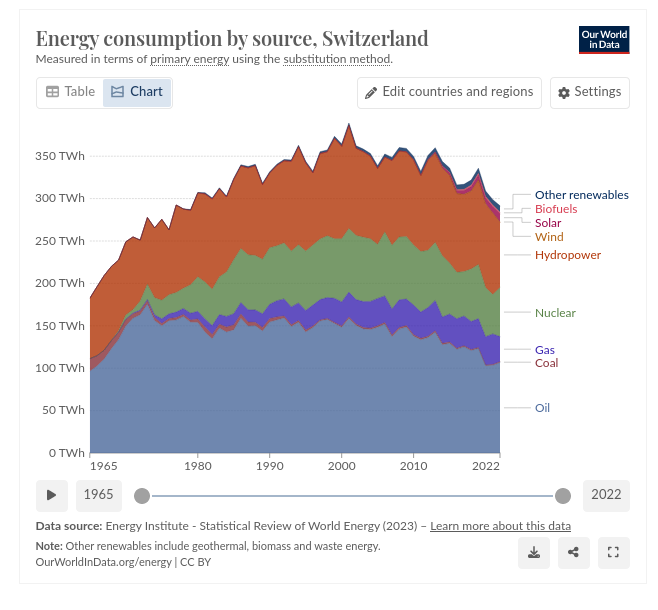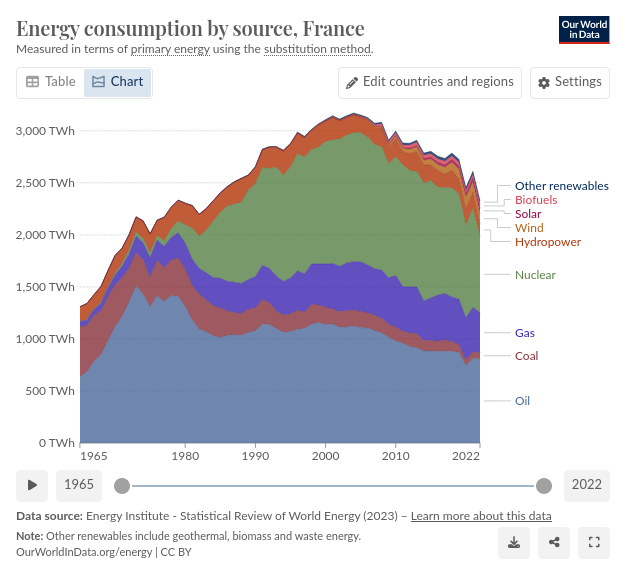“What was Windows even doing for us?”
Beautiful 🥲
“What was Windows even doing for us?”
Beautiful 🥲


Pretty good review!
I’ve not yet been to all the new planets. What I have seen lines up well with the characterization of Wube strategically disabling the things in the base game / on the starting planet (“Nauvis”) that I grew accustomed to. Instead of simply adding ever more lengthy production line recipes, they have forced us to approach many existing production lines in a drastically different way.
In the base game, you can play around with ratios and targeted throughput, but you almost always will have the same machines crafting the same recipes, in the same order. The most significant decision when designing a production line is often whether to bring an item in by belt or instead bring its components and craft it adjacently.
Space Age shakes that up by introducing several new choices/decisions to make. There are alternate recipes to be unlocked (similar in function to Satisfactory, without needing to hunt for hard drives on a map). There are now multiple “looping” recipes (the input items can be part of the output). Most notably, which recipes are available to you depends on where you are building - not only planetside vs in-orbit, but planetside vs in-orbit across all planets. The planets have different resources on them, and their orbits contain different ratios of resource-laden asteroids. Same goes for the routes between planets!
I was very afraid that the extension would feel like “more of the same, just longer and more tedious”. That’s the experience I’ve had with most overhaul mods I’ve tried, and notably why I never bothered paying Space Exploration (whose author ended up working with Wube on the Space Age extension). So far my experience has been the exact opposite. It really feels like every single new “thing” feeds back into the core gameplay by “rejuvenating” it in new ways.


There’s a scene in the game where the character is taking a shower. The shower stall is glass, and the glass is frosted from around ankle height to neck height.
I haven’t played the game myself, just came across the scene on YouTube several years ago, so I don’t know how justifiable the choice of the scene is in the first place. At least, from a technical point of view, it makes sense to me that they modeled the full nude body so that the frosted glass would blur what we “see” in a realistic way. It’s a lot easier to model something and then have the glass blur it, instead of directly modelling the blurred version for example.
Personally I think most of the creep factor comes from the fact that this character is explicitly modeled after a live human being who presumably didn’t sign up for that.
To be fair, weren’t Valve the first company to do that? People were really annoyed at having to install steam just to play some Half-Life.
Of course, that was only 1 launcher, no launcher-in-launcher shenanigans back then.


Aside from echoing @SnotFlickerman@lemmy.blahaj.zone and Doctorow’s statements about unionizing, I am aware of a few others who are trying things that I’d describe as complimentary to unions.
This is a panel titled “Why hasn’t Open Source Won?” where several of the speakers attempt to sketch out a framework wherein a programmer would have more decision over how their code is used: https://youtu.be/k3eycjekIAk . I’ll admit, I’m not the most impressed with where they get to in the limited time they have. Nevertheless, I think it’s a useful angle of consideration to have in the tool belt.
This is an org/foundation that is trying to walk the walk with regards to governing tech democratically: https://nivenly.org/ I haven’t kept up with any recent developments of theirs.


“I need some more [input] sanitizer for my eczema script, the console is red and inflamed whenever I check it.”

Interesting correlations with presidential election cycles


We also added the ability to pin the resource patch, and the count of remaining ore will update as the patch is mined. You can use this to keep an eye on how things are going, and be aware when a patch is running dry.
Yet another great mod transcending its mod status to be assimilated into the base game!


Having just watched the lecture, the only classified info I can recognize is the capabilities of 80s era satellites.
Given that, I think it’s quite a shame that the whole thing is only now available. Rear Admiral Hopper seems to have been someone who deeply understood both computers and people. The prescriptions she gives regarding “systems of computers” and “management” vs “leadership”, to name just two, are spot-on. Her lecture is quite grounded in what I’d call “military thinking”, but that’s just because she’s in a room filled with people who are of that life. In my opinion, everything she talks about is applicable to communities and businesses.
The general gist of the entire ~90mins reminds me of Project Cybersyn in its perspective on how computers could serve society.
The idea is neat, and there is a certain precedent for the approach in .htaccess files and webserver path permissions.
Still, I worry about the added burden to keeping track of filenames when they get used as stringed keys in such a manner. More plainly: if I rename a file, I now have to go change every access declaration that mentions it. Sure, a quick grep will probably do the trick. But I don’t see a way to have tooling automate any part of it, either.


Even a blank name can work for some; https://www.kalzumeus.com/2010/06/17/falsehoods-programmers-believe-about-names/ is a fun read if you’ve never encountered it before.
Do you perchance know if a similar manoeuver can be attempted to fix a mouse wheel click issue?


When you use Git locally and want to push to GitHub you need an access token.
I don’t understand; I can push to GitHub using https creds or an ssh key without creating access tokens.


An oldie but a goodie : https://csszengarden.com/


This is why I’m very pleased by how small in scope the upcoming Factorio expansion is compared to some of the mods that inspired/preceded it (notably Space Exploration).
In case the “dim” comment isn’t a joke, as I recall it’s short for “dimension”, as in you are specifying each variable’s dimension in the computer’s memory. Source: some “intro to programming with vb6” book I read like 15 years ago at this point.


Microsoft is pivoting its company culture
Oh yes, the thing they’re well known for succeeding at.


According to Our World In Data (which claims to use the Energy Institute’s Statistical Review of World Energy from 2023 as a data source), that waste is from producing around 70 TWh each year:

That only covers around a third of Switzerland’s energy consumption over those years. Furthermore, Switzerland is a small mountainous country with decent access to hydropower (making up around a third of its needs over the same years). They are not necessarily representative of the waste that would accumulate from a more agressive switch from fossil fuels to nuclear across the world (which is what we’re talking about, if I’m not mistaken).
France is about 10 times larger in surface area and according to the same source, consumed/produced over 1,000 TWh of nuclear energy each year:

And officially has still has no place to put the high-energy waste (source - in french), leaving it up to the plant’s owners to deal with it. There is an official project to come up with a “deep” geological storage facility, but no political will seems musterable to make that plan materialize beyond endless promises.
I should mention that I’m not super anti-nuclear, and I would certainly rather we focus on eliminating coal and oil power plants (and ideally natural gas ones as well) before we start dismantling existing nuclear reactors that are still in functioning order.
That being said, there are other problems with nuclear moving forwards besides waste management. The main one that worries me is the use of water for the cooling circuits, pumped from rivers or the sea. Not only do open cooling circuits have adverse affects on their surrounding ecosystems, as the planet gets warmer and the temperature swings during the hotter seasons become more pronounced, the power plants will become less efficient. The water going in will be at a higher temperature than it is today, and thus will absorb less energy from the nuclear reaction itself.
Overall, I don’t trust our current collective responsibility as a species to manage our current forms of nuclear production. Russia sent its own troops into the Chernobyl Exclusion Zone to dig trenches in contaminated soil last year, and they allegedly recognized last week that the Zaporizhzhia power plant is now “unsafe to restart” because of the military activity in the region.
The world has not experienced generalized warfare with nuclear power plants dotting the countryside; WW2 ended around a decade before the first nuclear power plants were up and running in the USSR, the UK, and the USA.
Not to mention how few European countries have access to uranium on their own soil/territory. Of course, most of the rare earth metals used in photoelectric panels and windmills aren’t found there either, but as least with “renewables” they are used once to make the machinery, not as literal fuel that is indefinitely consumed to produce power.
I don’t know enough about thorium-based reactors nor molten salt-based reactors to go to bat for them instead, but they seem like a more promising way for nuclear to remain relevant.

The comment in the 2nd screenshot, talking about the “new electric transfer station in Freetown Ma” along with the accompanying image looks it comes straight from a SCP appendix.
Math underlies programming in a similar fashion to how physics underlies automobile driving. You don’t ever need to know about newton’s laws of motion to pass your driver’s license and never get a ticket until you die. At the same time, I will readily claim that any driver that doesn’t improve after learning about newton’s laws of motion had already internalized those laws through experience.
Math will help your intuition with how to tackle problems in programming. From finding a solution to anticipating how different constraints (notably time and memory) will affect which solutions are available to you, experience working on math problems - especially across different domains in math - will grease the wheels of your programmer mind.
Math on its own will probably not be enough (many great mathematicians are quite unskilled at programming). Just as driving a car is about much more than just the physics involved, there is a lot more to programming than just the math.